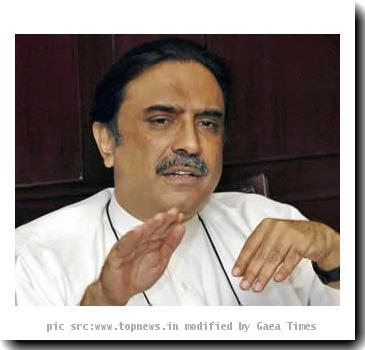Relief trucks mobbed in Pakistan by flood victims as authorities warn of famine
By Tim Sullivan, APTuesday, August 17, 2010
Flood victims mob relief trucks in Pakistan
SHIKARPUR, Pakistan — Victims of Pakistan’s deadly floods mobbed relief trucks carrying food Tuesday and authorities in the northwest warned of famine unless the region’s farmers got immediate help with planting new crops.
The floods began three weeks ago, but there is little sign conditions are improving for some 20 million people — or one in nine Pakistanis — who are affected. Tens of thousands of villages remain under water, and officials feared that more flooding could be on the way.
The already shaky and unpopular government has been sorely tested by the disaster, which is complicating the U.S.-backed campaign against Islamist militants. The international community is rushing water, medicine, shelter and aid workers to the country, but aid groups and the British government have complained that the response has been too slow and not generous enough.
President Asif Ali Zardari’s reputation sank to new lows after he chose to visit Europe on a state visit as the crisis unfolded. In a meeting with local aid groups, Zardari acknowledged Tuesday that the disaster response had not been very good.
“Yes, the situation could have been better. Yes, the arrangements could have been made better. Yes, everything could have been better,” he said. “We have to move forward despite whatever criticism we get.”
The U.N. appealed last week for $459 million for immediate relief efforts and has received 40 percent of that so far, said U.N. spokesman Maurizio Giuliano. Another $43 million has been pledged.
“We would like our pledges to turn into checks as soon as possible because the situation is getting very bad,” Giuliano said.
The World Bank said it will redirect $900 million of its existing loans to Pakistan for use in flood recovery.
For now, people displaced by high water are living in makeshift camps alongside their livestock or in flooded towns and villages.
“The vast geographical extent of the floods and affected populations meant that many people have yet to be reached with the assistance they desperately need,” the U.N. said. It also said the number of children and breast-feeding mothers affected and rising diarrhea cases “point toward a clear risk of malnutrition among the affected population.”
The floods have killed about 1,500 people and inundated 1.7 million acres (700,000 hectares) of wheat, sugar cane and rice. Food prices have risen sharply.
“It’s all been destroyed. I’ll get nothing this year,” said wheat farmer Zubair Ahmed in hard-hit Sindh province. “Nobody cares in the government. We’re stranded, and they don’t even pay attention to us.”
Aid distribution in Sindh was chaotic and patchy.
“We have never dealt with a calamity of this magnitude,” said Faisal Edhi, who works for Pakistan’s largest private welfare organization, the Edhi Foundation. “We’re trying to make it, but I don’t think we’ve been able to help 20 percent of the people we want to.”
In the town of Shikarpur, about 100 people mobbed two trucks that were dropping off food. People climbed the side of the truck to grab supplies, forcing relief workers to whip them with lengths of rope to keep them away.
Mir Hassan, an elderly flood victim, held out his empty hands after the trucks went through.
“I got nothing,” he said, complaining that people who were unaffected by the floods were taking the aid.
In the northwest, where the floods began, provincial Information Minister Mian Iftikhar Hussain said the irrigation system needed to be rebuilt urgently to revive the farming sector.
“If immediate steps are not taken, we fear a famine,” he said. “The farmers have lost everything: their crops, their machines, their houses, their seeds.”
U.S. Ambassador Anne Patterson said Washington had committed at least $87 million in aid and is expected to give more in the coming days. More U.S. helicopters were likely to join the 19 already dispatched to help ferry stranded Pakistanis and deliver food and other items, U.S. officials said.
Patterson said it was too soon to understand what impact the disaster would have on the Taliban and al-Qaida-led insurgency on Pakistani soil. But she played down concerns that Islamist militants were winning flood victims’ support through their own relief activities.
“To be blunt, I think these stories about extremist organizations being the only players out there are greatly exaggerated,” Patterson told a news conference in Islamabad.
In a reminder of the militant threat, police said they had arrested two suicide bombers on the outskirts of the main northwestern city of Peshawar. They were wearing jackets of explosives and were intending to attack targets in the city, said police officer Meera Jan.
Associated Press writer Nahal Toosi in Islamabad contributed to this report.
Tags: Asia, Asif Ali Zardari, Emergency Management, Europe, Famine, Floods, Islamabad, North America, Pakistan, Shikarpur, South Asia, United States


